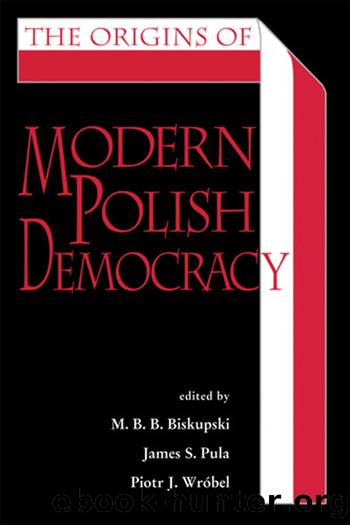The Origins of Modern Polish Democracy by Biskupski M. B. B.;Pula James S.;Wróbel Piotr J.;

Author:Biskupski, M. B. B.;Pula, James S.;Wróbel, Piotr J.;
Language: eng
Format: epub
Publisher: Ohio University Press
Seven Ideological Movements
During the German occupation, a few dozen clandestine political parties representing various more or less defined programs operated in Poland. These groups can be divided into seven major ideological movements: nationalist, Catholic, agrarian, democratic, Socialist, Communist, and PiÅsudskiite. The most popular and dynamic were the nationalist and agrarian movements, which were also characterized by the greatest degree of internecine divisions.
The nationalists posited the nation and the national interest as supreme and strove to create a state that would restrict the rights of ethnic minorities. The nationalists emphasized their Catholic character, condemned liberalism, socialism, and communism, and propagated anti-Jewish views. They believed that the strength of the nation was to be ensured by respect for tradition and family and by the countryâs uniformity of outlook. The power of the state would rest on favorable borders, internal strength and uniformity, as well as a strong army. The most important group within this trend was the underground Stronnictwo Narodowe (National Party). In 1942, one of its breakaway factions, together with the so-called Szaniec (Rampart Group), created the clandestine Narodowe SiÅy Zbrojne (National Armed Forces) and a secret political and military organization, the Konfederacja Narodu (Confederacy of the Nation). The nationalistsâ main goal was to establish a one-party system. This differentiated them from the conservatives, with whom they otherwise were closely associated. The National Armed Forces and the Confederacy of the Nation supported the postwar rule of a ânational elite.â3
The Catholic movement was under the strong influence of those nationalists who ostentatiously manifested their Catholicism. Both Catholic and nationalist movements emphasized the need for a return to the principles of traditional morality, defended the indissolubility of the family, and proposed a significant role for the Church in the education of society, particularly the younger generation. What differentiated the Catholic position from the nationalist beliefs was the fact that the former recognized Catholicism not as merely an important element of its ideological system, but indeed as its very basis. It relied unequivocally on Catholic social theory, while accepting political pluralism and parliamentary democracy. The tactical differences between the two movements were also significant. The majority of the nationalist factions opposed the London-based Polish government-in-exile and its agencies within Poland, whereas the Catholic camp was decidedly in favor of the London government and its delegates. Among several, mostly small organizations belonging to the Catholic movement, the most significant and influential was no doubt the Stronnictwo Pracy (Labor Party).4
The agrarians, who in Poland referred to themselves as populists (ludowcy) and were represented by the Stronnictwo Ludowe (SL, Peasant Party), regarded the peasantsâwho they believed represented especially valuable social, political, and even cultural qualitiesâas the fundamental strength of the nation. The peasants were thought to be endowed with characteristics such as love of freedom, moral purity, idealism, mutual solidarity, and aversion to any form of exploitation. Thus, the agrarians concluded that the peasants represented values that could become the source of national revival. The agrarians defended democracy, the parliamentary system, the equality of citizensâ rights, and the principles of social equality.
Download
This site does not store any files on its server. We only index and link to content provided by other sites. Please contact the content providers to delete copyright contents if any and email us, we'll remove relevant links or contents immediately.
The Vikings: Conquering England, France, and Ireland by Wernick Robert(83413)
Ali Pasha, Lion of Ioannina by Eugenia Russell & Eugenia Russell(40242)
The Conquerors (The Winning of America Series Book 3) by Eckert Allan W(37389)
The Vikings: Discoverers of a New World by Wernick Robert(36974)
Cecilia; Or, Memoirs of an Heiress — Volume 1 by Fanny Burney(32548)
Cecilia; Or, Memoirs of an Heiress — Volume 2 by Fanny Burney(31947)
Cecilia; Or, Memoirs of an Heiress — Volume 3 by Fanny Burney(31932)
Empire of the Sikhs by Patwant Singh(23074)
The Secret History by Donna Tartt(19053)
Hans Sturm: A Soldier's Odyssey on the Eastern Front by Gordon Williamson(18575)
Cat's cradle by Kurt Vonnegut(15335)
Pimp by Iceberg Slim(14488)
Sapiens: A Brief History of Humankind by Yuval Noah Harari(14368)
Norse Mythology by Gaiman Neil(13349)
Talking to Strangers by Malcolm Gladwell(13349)
Leonardo da Vinci by Walter Isaacson(13318)
4 3 2 1: A Novel by Paul Auster(12375)
Underground: A Human History of the Worlds Beneath Our Feet by Will Hunt(12090)
The Radium Girls by Kate Moore(12018)
